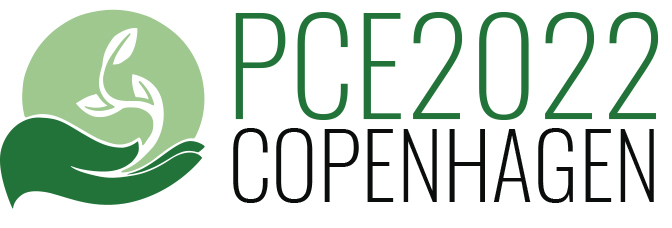Call for papers
Dear Colleagues
We invite all in the field of person centered and experiential psychotherapy and counselling to submit abstracts for the PCE2022 world conference.
Submission will end March 15, 2022.
We are looking forward to the results and insights of all scientists, theoreticians, trainers, supervisors and practitioners, who look closely into the conference theme:
"How Can I be of Help?" - Formulating and Facilitating Change Together
Other topics are also welcome at the conference.
The presentations will be available at the conference in Copenhagen. Some presentations will be video-recorded and available in the online conference program. Some presentation will be online only, but accessible for all attendees through the online conference program. When submitting your abstract there is also opportunity to upload online material for the benefit of the participants in the online conference program. Depending on your submission you can upload your presentation, a pre-recorded video of your presentation, extra material (a paper, chart etc.), or posters.
Your submission will be review by the Scientific Committees strong team of reviewers diverse on geography, gender, age, PCE-orientation etc.
Below you find the submission formats for the IN PERSON & ONLINE conference. We believe that the COVID-situation allows for a full IN PERSON conference in 2022 for the most parts of the world when we reach July.
Deadline for submission of abstracts is March 15, 2022
Deadline for upload of online material (video, poster etc.) after submission is May 1, 2022
For final acceptance of your submission(s), you need to register to the conference. Maximum 2 submissions as first author is allowed for the IN PERSON CONFERENCE delegates. Maximum 2 submission as first author is allowed for the ONLINE CONFERENCE.
We look forward to your presentation and to see you in Copenhagen 2022 or ONLINE.

David Murphy
Chair of the Scientific Committee

Niels Bagge
Chair of the Organizing Commitee
Formats for presenters
IN PERSON CONFERENCE
Formats for presenters registered at the IN PERSON CONFERENCE
Brief individual Papers:
20 minutes: 15 minutes presentation + 5 minutes discussion
This format encourages individual presenters to submit papers that are theoretical, brief empirical reports or that have a focus on practice. Individuals may submit their paper on their own or as part of a panel. If submitted on their own the Scientific Committee will thematically organise all individual papers and arrange them into 60-minutes og 90 minutes sessions to include three or four 20-minutes individual papers.
Individual Papers:
60-minutes :40 minutes presentation + 20 minutes discussion
The long paper submission will consist of a single paper presentation. Submissions will typically involve a 40 minutes presentation and allow a minimum of 20 minutes for discussion with audience participation. There will be only a limited number of these submissions accepted and the Scientific Committee might, after peer review, instead offer a presenter the opportunity to shorten their paper and resubmit as a Brief Individual Paper.
Panels/Symposium:
60-minutes: 3 x 15 minutes presentations + 15 minutes discussion
90-minutes: 4 x 15 minutes presentations + 30 minutes discussion
A panel/symposium may either be 60-minutes or 90-minutes, and include either three or four brief individual papers with a moderator/discussant who will be responsible for introducing the presenters, managing the time, and facilitating the audience discussion after the presentations have been made. All papers must be presentations that focus on the same theme and are related in their organisation and focus. The scientific committee will favour submissions that include presenters from different research groups or tribes of PCE. Submissions for this format must include both (1) an abstract that presents an overview for the whole session naming a moderator/discussant, AND (2) an individual abstract for each of the brief individual papers.
Structured Discussion:
60-minutes: 2-4 x 5 minutes statements + 45 minutes discussion
90-minutes: 2-4 x 5 minutes statements + 70 minutes discussion
A structured discussion provides an opportunity for group discussion among colleagues on a specific topic/theme. A structured discussion may either be 60-minutes or 90-minutes, and include two to four presenters offering a brief position statement (max. 5 minutes) on the topic/theme to elicit active participation from audience members. These sessions should be structured in a way that encourages and allows audience participation in the discussion for a substantial proportion of the time. A moderate/discussant may be chosen. The scientific committee might, after peer review, change the proposed length of the session.
Experiential Mini Workshop:
90 minutes
A mini-workshop (experiential) can be either an experiential workshop on any topic related to the conference theme that allows for a significant amount of time for audience participation through experiential exercises or other forms of audience participation such as discussions or practical tasks.
Demonstration Mini Workshop:
90 minutes
A mini-workshop (video-practice or live-demonstration) will focus on two perspectives on an aspect of psychotherapy practice. Each perspective is represented by a different person. Each perspective presented must include the presentation of video footage or live demonstration highlighting and centring a practice-focused issue. The focus is the same in each perspective. The video clips or live-demonstration form the basis for audience participation through discussion, experiential exercise or deliberate practice. It is preferential that video-practice/live-demo focused mini-workshops will bring together two of the ‘tribes’ and look at the ways in which different approaches might work with similar situations in therapy.
Poster:
120 minutes
There will be an in person poster presentation session within the conference programme. Posters are graphic representations of research studies that include the presentation of the findings of research study that has been carried out by the presenter. Physical poster sizes can be up to A0 (1189mm x 841mm) or A1 (841mm x 594mm) but no smaller than A1 size. The poster should also be posted online in the online poster gallery. Online posters should be a PDF-file with a page size of A4 and pictures no larger than 150 DPI.
ONLINE CONFERENCE
Formats for presenters registered at the ONLINE CONFERENCE
Online Brief individual Papers:
15 minutes presentation - pre-recorded video
This format encourages individual presenters to submit papers that are theoretical, brief empirical reports or that have a focus on practice. Online papers can only be submitted on their own and not as part of a panel. The Scientific committee will arrange he paper with other similar papers in he online program. The author uploads a pre-corded video of the presentation in the assigned video-format before May 1, 2022 (after submission deadline)
Online Individual Papers:
40 minutes presentation - pre-recorded video
The long paper submission will consist of a single paper presentation. Submissions will involve a 40 minutes presentation that the author pre-record in the assigned video-format, and upload before May 1, 2022 (after submission deadline).
Online Poster:
5 minutes poster presentation - pre-recorded
Posters can be submitted to the online poster gallery. Posters are graphic representations of research studies that include the presentation of the findings of research study that has been carried out by the presenter. Online posters should be a PDF-file with a page size of A4 and pictures no larger than 150 DPI. The author uploads a pre-corded video of a 5-10 minutes poster presentation in the assigned video-format before May 1, 2022 (after submission deadline)
Guideline for presenters
Presenters of accepted submission will find guideline for IN PERSON and ONLINE presentations in 2 PDF file for download:
Download guidelines for IN PERSON presentations (papers, panels, posters)
We wish you good work and luck with preparation of presentations. We look forward to your presentation at the conference.
Information on the submission of abstracts
-
Use the buttom Submit Presentation to submit your abstract for one of the formats for presenters (brief individual paper, individual paper, panel/symposium, structured discussion, mini workshops or poster)
-
This takes you to Oxford Abstracts login page for PCE2022. To submit you need first to login to Oxford Abstracts. This is very easy!
-
Log in to Oxford Abstract with your Google or LinkedIn account, OR create an account with your email.
-
When logged in you arrive at the PCE2022 Abstract Submission Form.
-
Please read carefully the instructions for each question in the PCE2022 Abstract Submission Form before you fill out the form
-
The questions "Abstract", "Authors and affiliations" and "Submission type" needs your full attention, especially when submitting a "panel/symposium" or "structured discussion"
-
When finished please submit. You can submit an unfinished abstract and return to it later.
-
This takes you to your Oxford Abstract Account page, where you can see your submission.
-
From the Oxford Abstract Account page you can access your submission and edit it or amend it. You can also submit a new abstract.
-
When login in again you will arrive at your Oxford Abstract Account page. Here you can:
- Edit an incomplete submission
- Amend (finish) your submission
- Add a new submission
- See comments from reviewers and scientific committee (when they are available)
Below is 4 videos that can help you when submitting. Good luck with your submission.. We look forward to your presentation at the conference.
Guide to structure your abstract
Here you can see the guidelines for writing an abstract for each for the formats for presenters.
Please read the guidelines below and ensure that you include the points in your abstract
All abstracts
Include description of how your presentation is related to the main theme of the PCE2022 conference: HOW CAN I BE OF HELP? Formulating and Facilitating change together.
Notice that some types of abstract can be submitted for IN PERSON conference only, and some for either the IN PERSON OR ONLINE conference that you have/will register for to attend.
Individual Paper & Brief Individual Paper (IN PERSON OR ONLINE)
They are papers that are theoretical, brief empirical reports or that have a focus on practice. Your abstract could be structured in the following way:
-
Motivation: What is the importance of the research, theory or practices? Why would a reader be interested in the larger work your paper relates to?
-
Problem: What research, theoretical or practice problem does this presentation address? What is the scope of the project? What is the main argument, thesis or claim?
-
Methodology: What methods are used? What type of data or evidence are used in the research. What type of theoretical or philosophical approach is used. How have you gathered information on practices?
-
Results: Describe specific data or findings that indicate the results of the project. Describe the theoretical or practices results.
-
Implications: How does this work add to the body of knowledge on the topic? Are there any practical or theoretical applications from your findings or implications for future research?
-
Discussion: What would you like to discuss with the audience?
Panel/symposium (IN PERSON )
When submitting a panel there MUST ALSO seperately be submitted abstracts for 3 brief individual papers for a 60 min panel or 4 brief individual papers for a 90 min panel using the proposed structure above. All papers need to focus on the same theme and be organized to best reflect the theme. The abstract for the whole panel/symposium could be structured in the following way:
-
Theme: Describe the theme of the panel.
-
Motivation: Describe the motivation for the panel.
-
Brief Individual Papers: Describe briefly what each brief individual paper contributes to the theme of the panel.
Structured Discussion (IN PERSON )
-
Theme: Describe the overall theme, focus or questions for the structured discussion.
-
Discussion: Name some main issues, dilemmas, conflicting ideas/practices etc. that makes this discussion necessary and important.
-
Brief Statements: List catchy headlines or brief statements for each presenter in the structured discussion indicating their position.
Experiential Mini-Workshop (IN PERSON )
-
Aim, focus and goal of the workshop.
-
Theoretical and methodical background for the workshop.
-
Experiential exercises, therapeutic methods or other types of audience participation.
-
Describe how you will use audio, video, artwork, demonstrations etc. in the workshop.
Demonstration Mini-Workshop (IN PERSON )
-
Aim, focus and goal of the workshop
-
Describe the two perspectives that meet and discuss in this workshop
-
Name some main issues, dilemmas, conflicting ideas/practices etc. that makes this workshop interesting, important or necessary.
-
Describe how you will use audio, video, artwork, demonstrations etc. in the workshop.
Poster (IN PERSON OR ONLINE)
Posters are graphic representations of research studies that include the presentation of the findings of research study that has been carried out by the presenter. Your abstract could be structured in the following way:
-
Motivation: What is the importance of the research? Why would a reader be interested in the larger work?
-
Problem: What problem does this work attempt to address? What is the scope of the project? What is the main argument, thesis or claim?
-
Methodology: What methods are used? What type of data or evidence are used in the research.
-
Results: Describe specific data or findings that indicates the results of the project.
-
Implications: How does this work add to the body of knowledge on the topic? Are there any practical or theoretical applications from your findings or implications for future research?
-
Discussion: What would you like to discuss with the audience? What type of feedback would you like from the audience?

